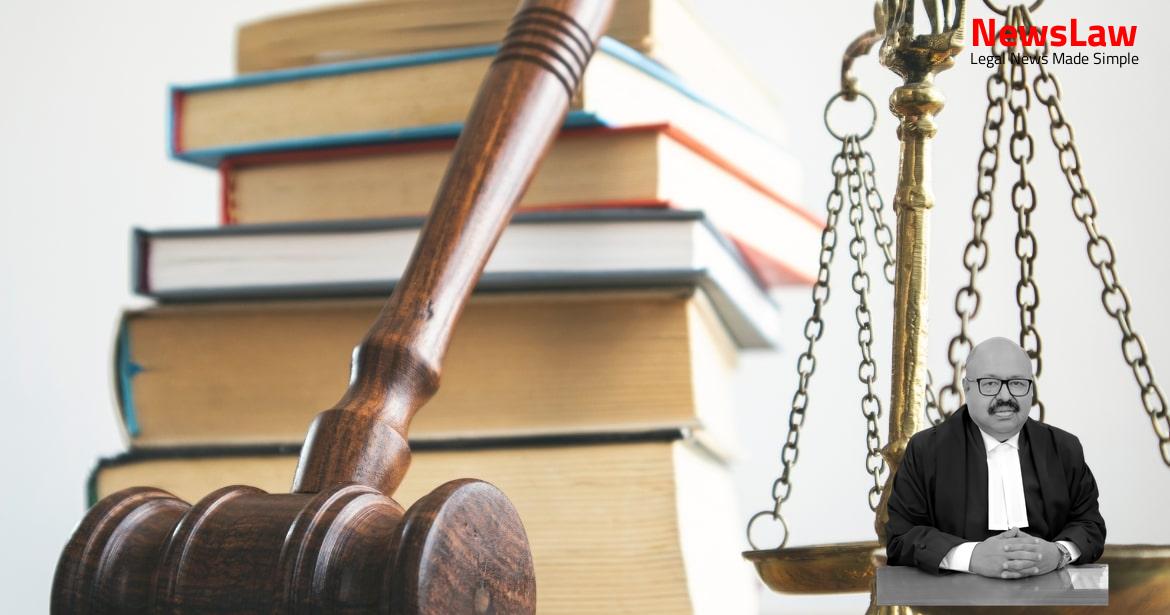Explore a detailed legal analysis on specific performance obligations in a recent court case involving a land sale agreement. The court’s examination of endorsements, limitation issues, and obligations towards third parties provides valuable insights into the complexities of enforcing such agreements. Discover the legal intricacies surrounding specific performance in land transactions in this informative blog post.
Facts
- The legal representatives of the original defendant were on appeal.
- The Agreement dated 19.06.1993 was deemed true and valid.
- The suit was found not to be barred by limitation.
- The plaintiff was held to be entitled to the relief of specific performance.
- The Trial Court decreed the suit for specific performance, which was later reversed by the First Appellate Court.
- Trial Court passed a Judgment and decree on 14.02.2012
- First Appellate Court concluded that certain endorsements in the Agreement of sale were not proved
- First Appellate Court found plaintiff did not prove readiness and willingness to perform obligations
- First Appellate Court held the suit was barred by limitation
- First Appellate Court denied specific performance relief to the plaintiff
- High Court reversed the First Appellate Court’s decision and restored decree for specific performance
- High Court considered the time for performance of obligations from the date of the defendant’s agreement for land purchase
- Plaintiff’s entitlement to specific performance was upheld by the High Court
Also Read: Undisclosed Conviction for Dharna Under Police Act Leads to Overturned Election
Issue
- Trial Court found that the sale agreement Ex. A-1 is true
- The First Appellate Court determined that the endorsements made on Ex. A-1 under Exs. A.2 to A.5 have not been proven
- The plaintiff argues that the endorsements have been proved by the evidence of P.Ws. 2 and 3
Also Read: Critical Analysis of Legal Principles in a High-Profile Criminal Case
Analysis
- The High Court failed to recognize that specific performance of the Agreement had two parts: (i) an agreement with the defendant’s brother’s wife for land access, and (ii) executing a sale deed for the property.
- The defendant’s denial of entering into an agreement with his brother’s wife was due to it being beyond the court’s power to compel a third party.
- The High Court’s decision on limitation was based on the defendant’s denial of executing the Agreement in his reply notice.
- The High Court mistakenly treated a factual finding as an answer to a substantial question of law.
- The High Court did not address the limitation issue under Article 54 of the Limitation Act despite its relevance.
- The High Court wrongly determined the suit was not time-barred without proper consideration of the endorsements on the Agreement and the applicable limitation period.
- The High Court erred in its understanding and application of the law related to specific performance against third parties, such as the defendant’s brother’s wife.
- Overall, the mistakes made by the High Court in framing questions, addressing limitations, and interpreting the Agreement led to an incorrect judgment.
- The performance of the second part of the obligation may be impacted by Section 12(1) of the Specific Relief Act, 1963.
- Section 12(1) of the Specific Relief Act, 1963 states that specific performance of part of a contract is subject to certain provisions.
- This section outlines exceptions and conditions for specific performance of a part of a contract.
- The case is not covered by sub-sections (2), (3) & (4) of Section 12 of the Specific Relief Act based on the Agreement of Sale.
- No exceptions contained in sub-sections (2), (3) and (4) of Section 12 apply due to the lack of access to the land without an agreement with the defendant’s brother’s wife.
- Section 13(1)(b) rights are not available to the respondent as the defendant had no legal right to compel three parties to convey their land for creating a pathway.
- The High Court’s decision to grant a decree for specific performance was a grave error in law.
- The appeal is allowed, setting aside the High Court’s judgment and rejecting the specific performance relief claimed by the respondent.
- A decree is made for the appellants to repay the respondent Rs.1,44,400/- with 9% interest per annum from the suit filing date.
Also Read: Analysis of Insider Trading Regulations
Decision
- The parties are responsible for their own costs throughout the proceedings.
Case Title: RAMAN (DEAD) BY L.R.S. Vs. R. NATARAJAN (2022 INSC 954)
Case Number: C.A. No.-006554-006554 / 2022



